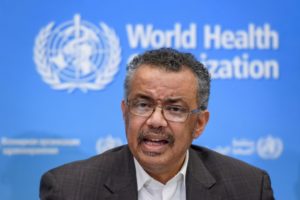 At least 23 countries are currently fighting outbreaks of Cholera, World Health Organisation (WHO) says.
At least 23 countries are currently fighting outbreaks of Cholera, World Health Organisation (WHO) says.
Globally, more than one million people are at risk of getting infected with the disease.
Also, 20 more countries sharing land borders with affected countries are also at risk, says WHO Director-General, Tedros Ghebreyesus.
The organisation recommends countries at risk of outbreaks to scale up surveillance to identify and manage cases easily.
Have You Read: Why Ethiopia Limited Social Media And Internet Access?
Cholera vaccines are limited in supply despite effectiveness.
According to the Director-General, the International Coordinating Group in charge of the cholera vaccines globally suspended the standard two-dose regimen.
In its stead, a single-dose approach was introduced to extend supply.
“In the meantime, we must rely on other measures to stop outbreaks and save lives,” he said.
The H5N1 Abian Influenza Infection
The DG noted that there has been report of mammals being infected with H5N1 avian influenza.
Although, the risk of this infection is low in relation to humans, he said this needed to be monitored still.
According to Mr. Ghebreyesus, the transmission of H5N1 to and between humans is rare
“But we cannot assume that will remain the case, and we must always prepare for any change in the status quo.
“As always, people are advised not to touch or collect sick wild animals but to report to local authorities.
“WHO is working with national authorities and partners to monitor the situation closely and to study H5N1 infection in humans when they occur,” he said.
WHO and other bodies work to provide advice to countries on the risk of influenza viruses to human health.

